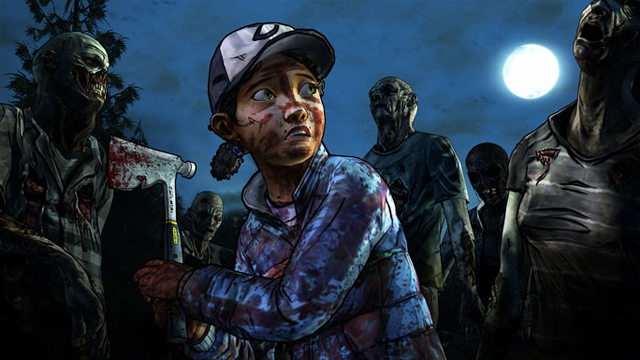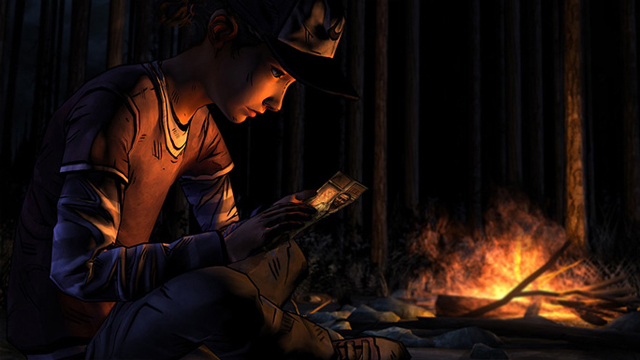Who can turn the world on with her lost childhood?
Here we are at the close of yet another emotional story. Clementine’s been through a ton of shit this season, all while maintaining the status of still… not… bitten. I enjoyed many of the themes that arose without Lee by her side, and of course, I was bothered by others. Ultimately, what separates this season from the last is that Clementine is forced repeatedly to act solely in her own best interests, which results in a good story but a finale that made me angry instead of ugly crying.
[Warning: Minor spoilers of earlier episodes.] Season 2 began with two of my favorite characters from last season, Omid and Christa. I liked Christa’s direct confrontations with Lee’s caretaker abilities, and I found Omid to be a genuinely likable character amidst a sea of complex survivalists. They were quickly taken from Clementine (and me), leaving us to travel alone in search of an entirely new family. It was disappointing to witness a story mechanic that wiped out the entire previous cast, but it ultimately did a good job of establishing the adversarial nature of the new one.
From the get-go, after Luke and Nick save Clementine and discover the dog bite on her arm, she witnesses how uncompromising other survivors can be even towards a child. Locked in a shed to fend for herself while dealing with a serious injury, Clementine becomes the protagonist. This is in contrast to Lee, who despite tensions, always managed to work with a group instead of repeatedly against it. It felt tough to watch how Clementine’s needs could be ignored, but I imagine that is the reality of this fictional setting. You reach a point where no matter who or what you are, you will always be assessed in terms of liability before your personhood. Everybody has lost an accepted right to exist except as determined by others.
This overall tone is also played in sharp contrast to any group of survivors’ attempts to stay in a given place. This story focuses a lot on the idea of shelter instead of the constant desire to move. Of course, our party, whatever its makeup, ends up traveling in each episode, but it’s always against their will. Whatever amenities each shelter does or doesn’t have never change the struggles each character bears, both inside that building and outside. It is constantly reestablished that each survivor’s individuality and history butts heads with the idea of home. Home also loses its place in this world.
So we return to focusing on a child, who becomes increasingly hardened by events as they unfold. What culminates in the final scenes, actually the majority of the final episode, is such a clash of personalities that I sadly gave up on each person I met. It’s not that I couldn’t understand their motivations, but something about the writing this season suggested to me that these people will fight just to fight and switch their alliances just to suit the moment.
That’s a fault of any morally ambiguous narrative—characters can flip-flop under the guise of survival. It just felt particularly forced and unnatural for this go-around, and as much as I tried all season to maintain unity, I ended the game with decisions tantamount to a giant middle finger to all of them. In fact, I wish Clementine had done that. You may disagree. But plenty of characters I rooted for are dead, so my investment dwindled.
Beyond the story in this kind of game, there’s not much to describe, but if you’re new, I will reiterate. The graphics are remarkably cel-shaded, and each scene looks like it’s torn from the pages of a comic book. Music and voice acting are still top-notch. And the controls are approachable to even casual gamers, however defined. The majority of action is done by clicking on dialog options, and occasionally, you’ll be asked to perform keyboard actions in tandem with on-screen signals. It’s never complicated, but it certainly is not robust. I typically play games for the story, so I shouldn’t complain, but I always feel like I could be more engaged when I play a Telltale game.

I loved how Clementine’s character grew, and despite her occasional pines for Lee, her independence and strength shine. She’s grown beyond the limitations she had in the first season, and wherever the story takes us next, I believe she will continue to grow. I just wish the majority of the other characters didn’t leave such a bad taste in my mouth, especially in the final episode. Ambivalence aside, this is definitely an engaging and challenging story worth imbibing.
-
Consistently great cel-shaded graphics
-
Excellent voice acting and music
-
Same ol’ simple controls
-
Engaging story that really strengthens Clementine’s character
-
Many conflicts felt very forced, especially in the finale
-
Less emotionally impactful ending to season







